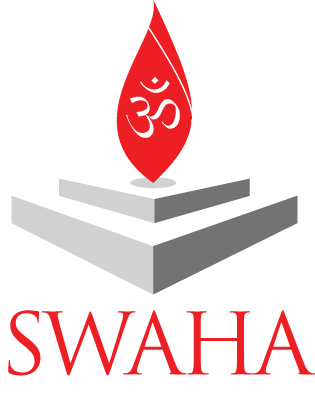Pt. Jaidath Maharaj M.Ed. (dist.)
President, SWAHA International
SWAHA Inc. continues to provide guidance to the national community in light of the symptoms being experienced by our society in this VUCA (Volatile, Uncertain, Complex, Ambiguous) environment. We are all experiencing pains arising from many global events including economic depression, climate change, natural disasters and crime. Currently, we, just like the rest of the world, are grappling with the impact of the COVID-19 global pandemic. In such times, astute leadership is needed to alleviate the distress of our citizens from both physiological and psychological pain. It is in light of the need to constantly navigate the VUCA environment that SWAHA extends itself for the benefit of the wider society. As a socially responsible organisation, the Dharma Mandal of SWAHA (board of directors and theological board) continues to engage in discussions to guide our members through these tough times.
SWAHA’s underpinning philosophy remains “enlightened ritualism”. By decoding our practices, SWAHA has guided the Hindu and national community and contributed to individual, family, community and nation building. SWAHA subscribes to the principle of Kaal, Desh and Avasar (time, place and circumstances), which has ensured that as a community, we have endured various challenges and obstacles, demonstrating our resilience as an organisation as we continue to evolve.
The applicability of SWAHA’s philosophy is especially crucial in these turbulent times, as we are required to adjust in the face of a volatile and uncertain environment. In such circumstances, astute leadership is critical and SWAHA sees it as a sacred obligation to guide our members and supporters in these turbulent times. SWAHA has responded to this need by guiding our members in the performance of rituals, rites and application of the principles contained in our scriptures.
SWAHA has been the first to respond to the need for adaptation based on our local context by decoding the underlying philosophy of our rituals. Many of these rituals have been adapted to suit the limitations of our circumstances without losing the essence and benefits of the rituals. One example of this is the response to the current spread of the COVID-19 virus where many restrictions have impacted the manner in which Hindus conduct their ceremonies. While most ceremonies can be postponed (puja, yagya, satsang), the funeral rites (Antyeshti Karam) and the post-funeral rites cannot be postponed. Indeed the membership of SWAHA is currently faced with the challenge of conducting the post-funeral rites for their loved ones as follows-:
- Satsang (nightly prayer on behalf of the departed)
- Shaving (purification rites)
- Shraadh Karam (closing-off ceremony)
Consistent with our philosophy, SWAHA advises that the post-funeral rituals be modified while maintaining the essence of the practice and ensuring adherence to the safety requirements outlined by the Ministry of Health. Therefore, members are advised to cut hair and shave heads at home followed by a bath on the morning of the given day. The family should offer tarpan (water, black till and rice) on the kush grass while facing south, after which tulsi water or Ganga jal (holy water) should be sprinkled throughout the house. Food may be prepared and offered to the lower forms of creation and to the family members. The families can engage in satsang nightly by singing bhajan (holy songs) and reading passages from Shri Ramaayana and Bhagwat Gita (holy scriptures). The members of the family should give charity to the needy as a means of blessing the departed soul on its journey (donation of food, medication, masks). These practices are meant to bring psychological closure to the family members and to repay debts of gratitude owed to society. Therefore, these adjustments allow for the benefits of the post funeral rites to be gained while respecting the safety requirements set out by the Ministry of Health.
In this regard, SWAHA continues to lead the way in the evolution and relevance of Hinduism in Trinidad and Tobago.

